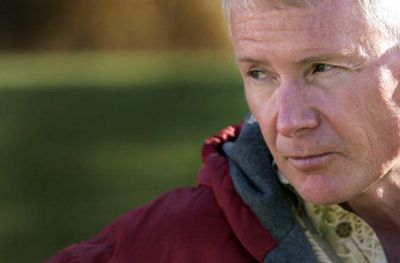Teachers share Iraq experiences

As Kevin Kincheloe sat in his living room with his wife on Friday, playing holiday songs on his guitar, he started to cry.
He had flashbacks to last Christmas, when he spent the day in a Humvee, escorting gun-carrying semitrucks to American bases near the Sunni Triangle.
He thought of the troops who are still overseas.
He remembered the Iraqis he befriended in his year there.
“I didn’t expect that,” said Kincheloe, who has been back for a month. “I didn’t expect the emotional stuff.”
After all, he used a health lesson he teaches eighth-graders while stateside to help keep his troops sane. He spoke to them about balancing their physical, social and emotional triangle.
“Even knowing that, it’s hard,” Kincheloe said. “Nothing can prepare you for that experience.”
Kincheloe is one of several North Idaho teachers who for a while traded their classrooms for tanks. Being educators, they brought a unique perspective to combat experience.
Sgt. 1st Class Kincheloe, who teaches, counsels and coaches at Kootenai High School near Harrison, brought a love of kids to his National Guard service. He practiced his Arabic with schoolchildren and helped them with their English in return. Whenever Kincheloe would visit a village, he loaded the back of his Humvee with stuffed animals, clothes and shoes.
“It’s hard because the kids don’t have a lot” and would ask soldiers for more, Kincheloe said. That burned out some of Kincheloe’s brothers in arms, who ended up pushing the kids away.
“Kids would search out my Humvee,” he said. “They knew I was a softie.”
He was also used to dealing with children, especially those in junior high, who are difficult regardless of their location on Earth.
Seeing the disparity in resources, though, has had a lasting impact on Kincheloe. “I’m a lot less tolerant of negativity.” When he sees Idaho students treating each other improperly or worrying about little things, he thinks of how unnecessary it all is.
“I guess I have a different perspective, what really is important,” Kincheloe said. “What they have over there and what we have over here, it’s night and day.”
Asked what he thinks about the war, Kincheloe, whose service is coming to an end, would only say: “Ask me in a couple of months.”
Another teacher, Chris Sensel, who lectures on social studies at New Vision High School in Post Falls, drew on his understanding of Middle Eastern history when assessing the situation in Iraq.
Western powers drew the map of the modern Middle East after World War I, and the boundaries of Iraq lumped together diverse groups: the Sunni Arabs, the Shiite Arabs and the Kurds, who are mostly Sunni.
Because of that historical reality, one could expect that installing a representative government would be a tough challenge, Sensel said. “And it’s proving to be a tough challenge.”
On the other hand, he reminds people that it took the United States 150 years to give women the right to vote. “We’re trying to do that in a couple of years in Iraq,” said Sensel. “We’re going through a very long process in a very short period of time.”
Sgt. 1st Class Sensel recalls how his interpreter described a former Iraq, where the standard of education was a model for the region. That changed under Saddam Hussein’s reign, but now there’s hope for resurgence, he said.
“I thought it was exciting to be a part of that change,” said Sensel, who serves in the National Guard and got back from Iraq in March. “You feel like you’re a part of history.”
Andrew Whipple, a social studies teacher at Kootenai High School, predicts a happy ending to the war. “I think the history books 20 years from now will say it was the right thing to do.”
Capt. Whipple said the time he spent in Iraq gave him a better understanding of Islam and Middle Eastern culture that he can’t wait to take back to his students.
“There’s a lot of difference and there’s a lot of similarities,” Whipple said.
In Iraq, religion plays a bigger role in people’s lives, he explained, giving as examples the fact that children pray five times a day and fast during the month of Ramadan.
Whipple was surprised to learn that there were other areas where Iraqi teens didn’t differ at all. “They wanna have the latest Game Boys; they wanna have the latest jeans,” he said. “They wanna drink Pepsi Cola.”
Though Whipple is glad to be back with his family and enjoys the convenience of life in the United States, he misses his work in Iraq.
“I felt like I was having a big influence over there,” he said. He remembers Election Day, when people donned their best clothes in celebration. “I know I was making a difference over there, helping the Iraqi people. I miss that.”
The opportunity to go abroad and visit one of the world’s earliest civilizations is an advantage few social studies teachers can claim, Whipple said. He will be taking his experience and photographs with him when he goes back to the classroom mid-January.
“I think it’ll make teaching world history more lively,” he said.